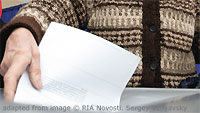Summer is cancelled for Russia’s bureaucrats - but will they play ball?

(Mikhail Loginov – www.opendemocracy.net – November 2, 2012- Mikhail Loginov is a journalist and novelist based in St. Petersburg. He is the author of the recently published bestselling political thriller “Battle for Kremlin”.)
October is Russia’s local election month, and some regions have just elected governors for the first time in seven years, part of an electoral reform designed to appease the opposition. But as Mikhail Loginov reports, another aspect of this reform will antagonise the regime’s most loyal supporters its own bureaucrats.
The key participants in Russian elections are not the voters, and not even the members of the election committees who tot up the votes and then tweak them in favour of the United Russia candidate. The main players are the bureaucrats, at district, municipal and regional level, who are responsible for the organisation and results of this democratic exercise. These officials are as yet unaware of what is going to hit them in 2013, when elections of one kind or another will begin to be held not in October, but in September. The people behind this innovation designed it in the first place as a move against the opposition, but it is their loyal officials that will be hardest hit.
Some extremely unpleasant news and its consequences
Russians go to the polls every four or five years to elect local councils, mayors, and (once again) governors, but these elections are not synchronised across the country, and in any given year there will be elections in some regions. So each year towns and cities across Russia become the scene of events reminiscent of the opening of Gogol’s famous comedy ‘The Government Inspector’.
The regional governor, town mayor or district council head calls together his subordinates to inform them of some ‘extremely unpleasant news’. The news is not, however, as in Gogol’s work, that a high ranking official is coming from the capital to carry out an inspection, but that it is time to elect a new local or regional authority or its head.
In Gogol’s play, the news of an impending inspection jolts the town bureaucrats into hurriedly paying attention to their official duties, or at least going through the motions. Today’s election briefings provide a similar stimulus. Since elections mostly take place in autumn, on the second Sunday of October, officials are under strict orders to be back at their desks after their holidays no later than 1st August. And this applies not only to the heads of the health, education and utilities departments,may see a rash of hard-hitting campaigning activity by opposition forces.
I should add that in Russia the month of August has a very bad reputation. Since 1991, the year of the abortive attempt by part of the Communist elite to overthrow Gorbachov, many Russians always expect something awful to happen in August: a financial crisis, a terrorist attack, a natural disaster, a war. In the tabloid press it has become standard practice to describe anything bad that happens in August, however insignificant, as a ‘catastrophe’. Up until now, with elections taking place at the beginning of October, September has always been a ‘buffer month’ when people could forget whatever happened in August. Now that buffer has disappeared, and some insignificant event in August could reawaken voters’ anxieties and fear, with who knows what unexpected consequences for the regime.
Among all the mistakes made by the Kremlin and United Russia in 2012, the introduction of a single day in September for holding local elections might seem the least important. But it could turn out to cause unforeseen damage in the future, when Russia has a strong opposition and the bureaucrats are even more sluggish than they are now.
Article also appeared at bearing the following notice: http://www.opendemocracy.net/od-russia/mikhail-loginov/summer-is-cancelled-for-russia%E2%80%99s-bureaucrats-%E2%80%93-but-will-they-play-ball
 This article is published under a Creative Commons licence. If you have any queries about republishing please contact us. Please check individual images for licensing details.
This article is published under a Creative Commons licence. If you have any queries about republishing please contact us. Please check individual images for licensing details.
